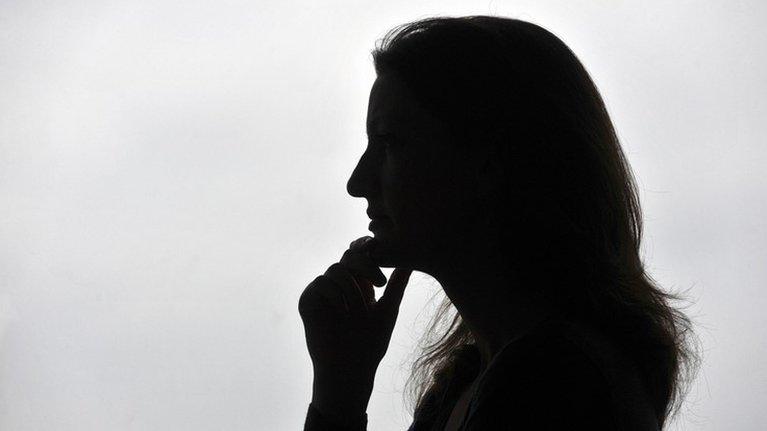Why toilets are a battleground for transgender rights
- Published
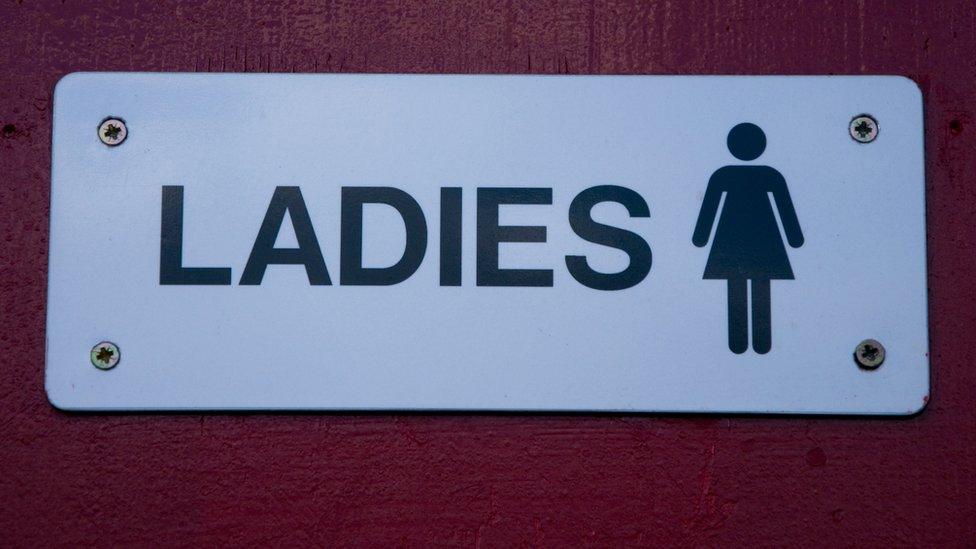
A transgender woman in Jersey recently won a discrimination case in which she argued the word "ladies" was indirectly discriminatory
With President Obama facing legal action from 12 states, toilets in the US have become a flashpoint for transgender rights. In Jersey, a transgender woman recently won a landmark case, after arguing the words "ladies" and "gents" on a ferry's toilets were discriminatory. But why is the issue of transgender people and toilets so emotive?
"I get stared at, I've been spat at, I've been shouted at - 'transgender, tranny, transvestite'," says Morganna Snow.
Ms Snow, a transgender woman from Gloucester who has presented publicly as a woman for about three months, says she "more regularly than not" experiences abuse when she tries to use public toilets.
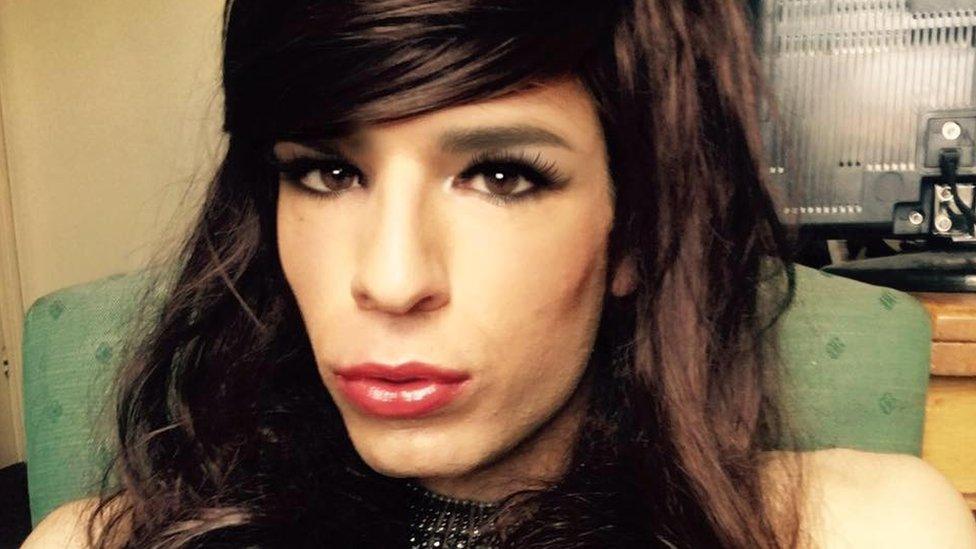
Morganna Snow says she worries about being sexually or physically assaulted in public toilets
She says she was recently in a nightclub in her home city when she was asked to leave the women's toilets, external by a member of staff, who told her she had to use the disabled toilet, even though the lock was broken.
The experience left her feeling "violated" and "stripped of my identity".
"Being transgender is not a disability, and she made me feel so small, like I was worthless... it felt like I was doing something wrong, like stealing," she says.
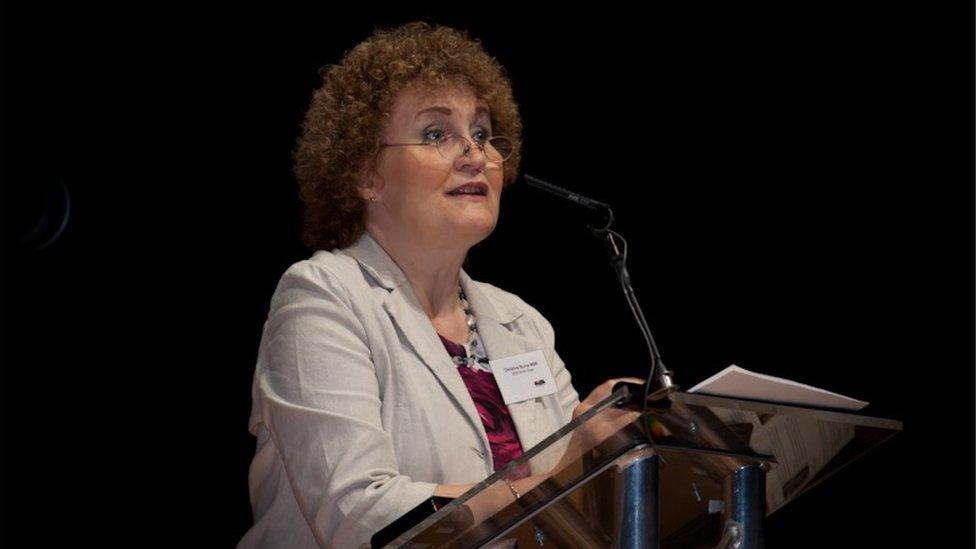
Christine Burns was appointed MBE in 2005 for her work representing transgender people
Addressing what she says is the "irrational fear" that allowing transgender people to choose their toilet could lead to more women and children being attacked, political activist and author Christine Burns argues that "people who want to be perverts... don't need permission".
In March North Carolina passed a law requiring people to use public toilets that correspond with the sex listed on their birth certificate, with the state's Republicans arguing the measure was necessary to protect women and children.
"There's plenty of cases of men assaulting women, and they don't need the excuse of pretending to be women in order to do it," says Ms Burns.
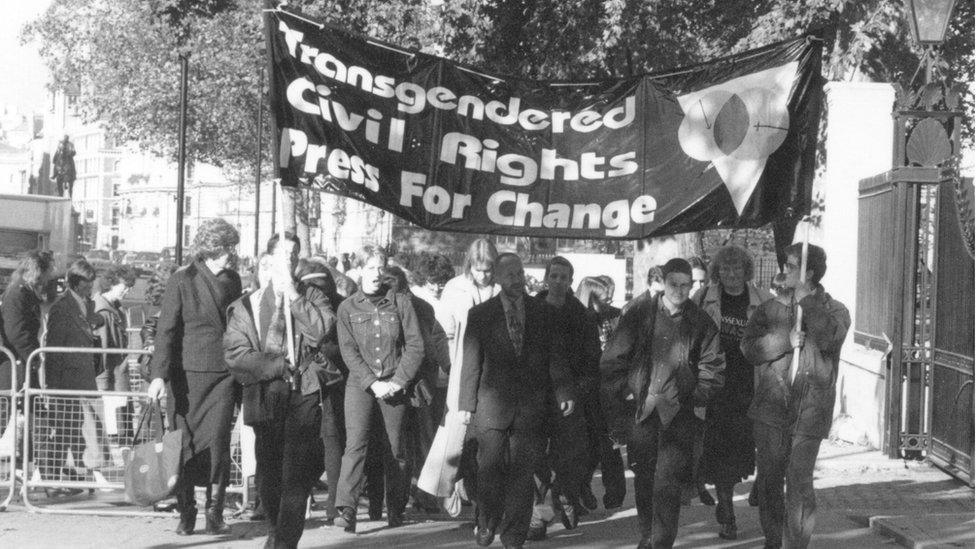
Activists in 1997 delivered a 10,000-signature petition to Downing Street to press for greater transgender rights
And allowing transgender people to use their chosen toilet is actually in part about protecting them from violence, she says.
"It's clearly not safe to require somebody who presents as a woman to go into a men's toilet. The evidence is, from the cases that have happened, is that real assault takes place, real people get hurt."
Ms Burns says transgender men tend to "pass an awful lot more and an awful lot faster" in their reassigned gender, but the law in North Carolina would oblige a transgender man, who might have "enormous muscles, and a beard, and a deep voice", to use the women's toilets.
Matt Horwood, from the LGBT charity Stonewall, says toilets can pose a "twofold issue" for the transgender community.
"Many people from the trans community are happy to use bathrooms that are binary, so a male bathroom or a female bathroom, but it's about the attitudes that other people have towards them using those bathrooms that are problematic," he says.

The charity Stonewall campaigns for LGBT rights, which includes those of transgender people
He suggests gender-neutral toilets can be reassuring for some transgender men and women who "fear" discrimination in binary toilets, especially following the "backlash towards the trans community" in the United States.
And for transgender people "who identify as non-binary, neither with the gender male or female", having gender-neutral facilities is "one way of not excluding their gender identity", Mr Horwood says.
The charity is currently introducing gender-neutral toilets at the building it rents in London, and recommends other workplaces do the same, external.
"We're literally changing the sign on the door to say gender neutral," which is "easy enough" for other organisations to do too, Mr Horwood says.


Bruce Springsteen, seen here performing on his The River Tour in Dublin, recently cancelled a gig in North Carolina over the so-called Bathroom Bill
What is happening in the US?
The US state of North Carolina enacted a law in March which means people must use the toilet that matches the gender on their birth certificates
Legislators pushed for the so-called Bathroom Bill after the city of Charlotte passed an ordinance allowing transgender people to use restrooms according to gender identity
The law has prompted a huge backlash from campaigners, businesses and artists, with stars such as Bruce Springsteen and Ringo Starr cancelling concerts in the state
In May the Obama administration hit back, issuing a directive ordering public schools to allow transgender students to use the toilet that corresponds to their gender identity
Since then 12 states have announced they will sue the federal government over that directive, including Texas, Alabama and Wisconsin

The number of discrimination cases brought by transgender people is on the up, according to Robin White, an employment and barrister who is also transgender.
"The social norm, that we need to be more accepting of trans people, and alter our behaviour or the way we do things to assist trans people, has grown" in the past 20 to 30 years, she says.
Under the Equalities Act 2010, external gender reassignment is one of nine "protected characteristics" - including race, religion and sexual orientation - that are illegal to discriminate against, either directly or indirectly.
Any requirement for people "to appear to be of a particular sex to use a particular facility" could therefore indirectly discriminate against a transgender man or woman, because an unsuccessful transition might mean they do not meet that appearance characteristic, Ms White says.
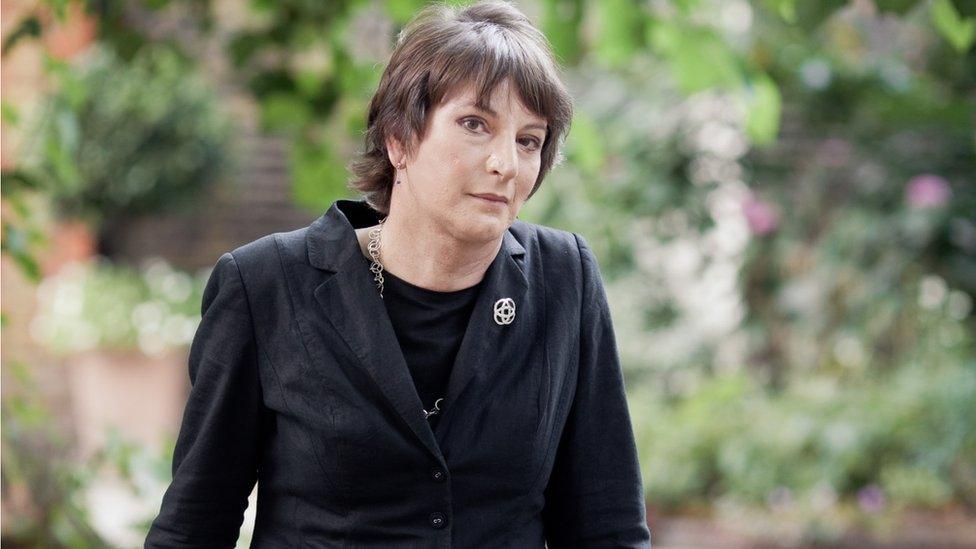
Robin White practises employment and discrimination law at Old Square Chambers in London
Currently only "people who are proposing to, are undergoing or have undergone gender reassignment" are protected by law, she explains.
However, the 2015 Women and Equalities Committee report on transgender equality, external has suggested the government considers changing the law to cover non-binary gender identities.
For Morganna Snow, it is time that there was an attitude shift in the UK over the transgender community's use of public toilets.
Speaking of her recent experience, she says: "It's really hit me hard, because now I don't feel like going out at all.
"In public, yes, I can walk down the street and then hold my pee in and go home, it's made me do that now.
"Having that animosity out there and the negative stigma about transgender - I do want to change that, especially in the UK."
- Published25 May 2016
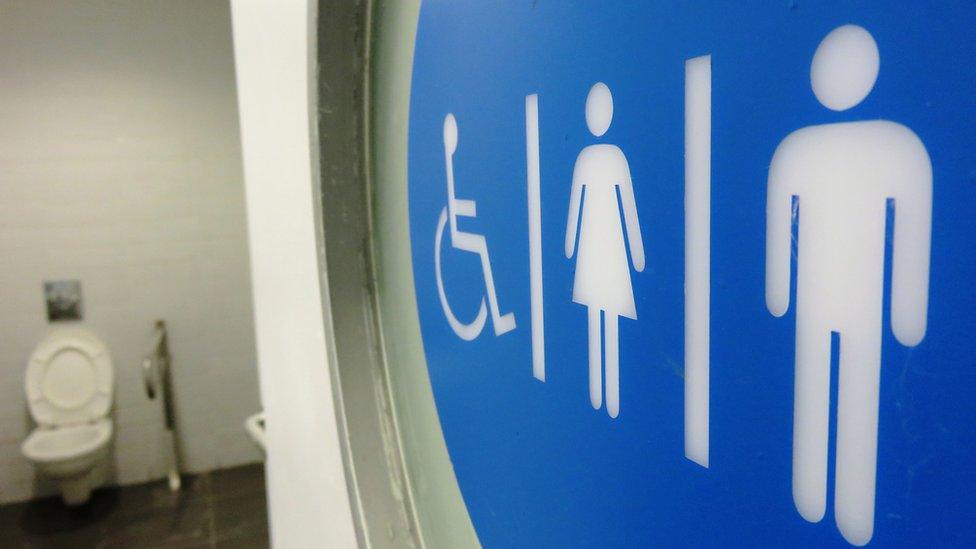
- Published13 May 2016
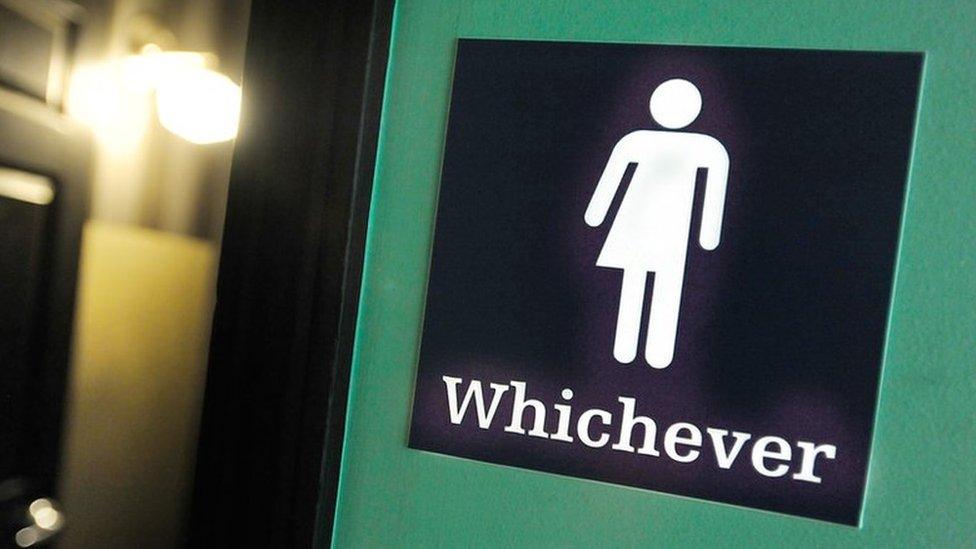
- Published3 May 2016

- Published14 April 2016

- Published6 April 2016

- Published31 March 2016
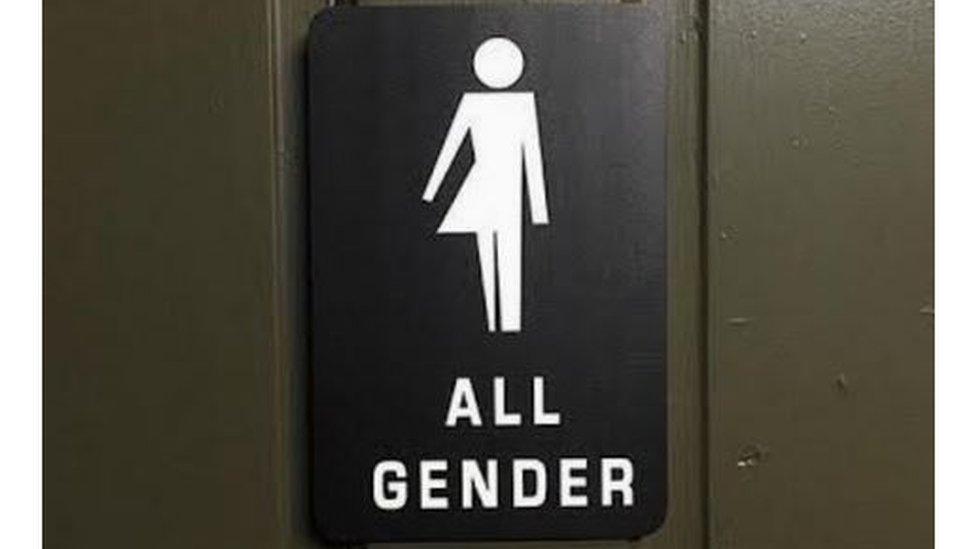
- Published21 February 2016
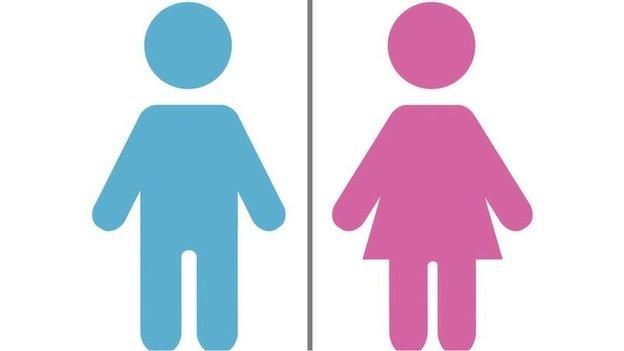
- Published14 January 2016
